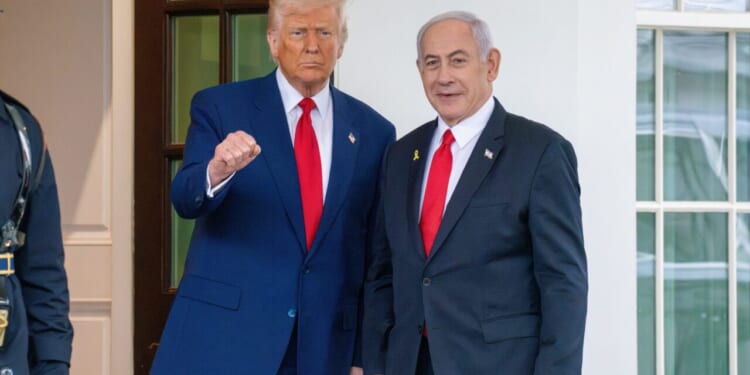President Trump’s steamrolling toward a lasting deal in Gaza could deliver a crowning blow to the Israeli government.
A potent version of the Changing of the Guard, viewed annually by millions of spectators at Buckingham Palace and Windsor Castle, is playing out presently on the British Empire’s former stomping grounds. The Middle East, where provisions for the aftermath of the Gaza war are the subject of intense discussion and activity, is in the throes of upheaval with principals jockeying to exert influence over the region’s future. One of them, Israeli prime minister Benjamin Netanyahu, is getting trampled—or rather, “Trumpled”—royally by the process. The damage to him may be irreversible.
With combat in the Gaza Strip winding down—to the chagrin of some Netanyahu allies who would persist in battle—leadership vacuums have emerged on both sides of the border. Earlier initiatives to draft plans for post-conflict Gaza never came to fruition, owing to, among other factors, Israel’s refusal to countenance any role for the Palestinian Authority. Hamas, which Netanyahu pledged originally to “eliminate,” has seized that opening to exercise violent control over territories evacuated by the Israel Defense Forces (IDF). Any hopes for alternative rule in Gaza will have to contend with the prospect of armed resistance from retrenched Hamas militants.
A similar void exists within Israel, where the senior ranks of Netanyahu’s professional team are almost emptied out. Ron Dermer—his closest confidant and Trump administration whisperer—has just resigned as strategic affairs minister. His exit follows that of Tzachi Hanegbi, Israel’s national security advisor, who was dismissed on October 21, against the backdrop of disagreements over policy. Tzachi Braverman, the chief of Netanyahu’s personal bureau, will be heading to London shortly as Israel’s next ambassador to the Court of St. James. Major turnover at the top will create an inevitable operational deficit, as experienced hands depart at a critical moment for Israel.
Filling the space enterprisingly is President Donald Trump, who has stepped in to run roughshod over all parties amid a possible collapse of a US-sponsored ceasefire. “If Hamas does not behave,” he threatened on October 29, “they will be terminated.” But it is Israel—whose reliance on America’s diplomatic, military, and economic munificence renders Netanyahu beholden to Trump’s demands—that has been the beneficiary of a tangible, full-court press from Washington. “I pushed [Netanyahu],” the president told 60 Minutes on October 31, “I didn’t like certain things that he did, and you saw what I did about that.”
Recent weeks have seen consecutive visits to Israel by Trump, Vice President JD Vance, Secretary of State Marco Rubio, Joint Chiefs chairman General Dan Caine, and presidential peace envoys Jared Kushner and Steve Witkoff for the sake of ensuring Netanyahu’s acquiescence to the White House program for ending the standoff. Together with the inauguration of a Civil-Military Coordination Center in Israel—from where hundreds of US personnel “support stabilization efforts” and “monitor implementation of the ceasefire agreement”—Trump has solidified his status as the final arbiter of all things Gaza-related.
Today, Netanyahu, who used to revel in his ability to steer relations with the United States—“leave America to me,” he has said confidently—finds himself now as the butt of unrelenting criticism within Israel for abdicating the country’s sovereignty to Trump. Gone is the bravado that Netanyahu would display when he sparred with the Biden administration, which he would try to outmaneuver constantly. Those tactics would only backfire with what has become an imperial presidency. “He has no choice,” Trump counseled the prime minister on October 4. “With me, you got to be fine.”
The prime minister’s back is up against the wall. Enthusiasm within his cabinet for Trump—which peaked when the president floated his idea to take over Gaza and turn it into the French Riviera—has tanked. Trump’s commitment to preserving the ceasefire has seen him downplay Hamas violations and circumscribe Israel’s freedom of action. US officials have intervened to scrap Israeli retaliation that would have included blocking humanitarian aid and expanding the IDF perimeter in Gaza. Many of Netanyahu’s partners were particularly despondent when Trump told Time Magazine emphatically that West Bank annexation “won’t happen” and that “Israel would lose all of its support from the United States” if it did.
Strategic challenges face Netanyahu in navigating negotiations with Trump over the second phase of the ceasefire. Questions pertaining to the nature of future governance in Gaza, the extent of Hamas demilitarization, and the contours of the IDF’s redeployment will impact the degree of Israel’s vulnerability to a repeat of the October 7 massacre. The prime minister’s approach to these issues—on which he will seek maximum latitude—is likely to clash with the president’s agenda, which favors greater compromise for the sake of making more rapid progress.
Equally impactful for Israeli security will be the profile of a proposed international stabilization force (ISF). Trump’s fondness for the rulers of Turkey and Qatar and their deep involvement in the Gaza project are raising alarm in Israel, where decisionmakers object to the elevation of two nations that have given refuge to Hamas captains. The consequent relegation of Saudi Arabia and the United Arab Emirates—which have taken a tougher approach toward Hamas—to the back seat runs counter to Israel’s preferences. According to a senior American official, “the Israelis gagged” over sections of the ISF draft resolution which the United States shared with select UN Security Council members on November 3.
Besieged already by domestic crisis and a squabbling coalition, Netanyahu’s protestations of autonomy are ringing hollow. He might even be praying wistfully for the “No Kings” demonstrators to succeed in curbing Trump’s power to operate unilaterally. As it stands, however, the president’s steamrolling toward a lasting deal in Gaza and increased normalization with the Arab world—while it could wind up bringing greater long-term stability to Israel—could, ironically, deliver a crowning blow to its government.
About the Author: Shalom Lipner
Shalom Lipner is a nonresident senior fellow at the Scowcroft Middle East Security Initiative of the Atlantic Council’s Middle East Programs. He served seven consecutive premiers over three decades at the Prime Minister’s Office in Jerusalem. Follow him on X: @ShalomLipner.
Image: Shutterstock.com.

















